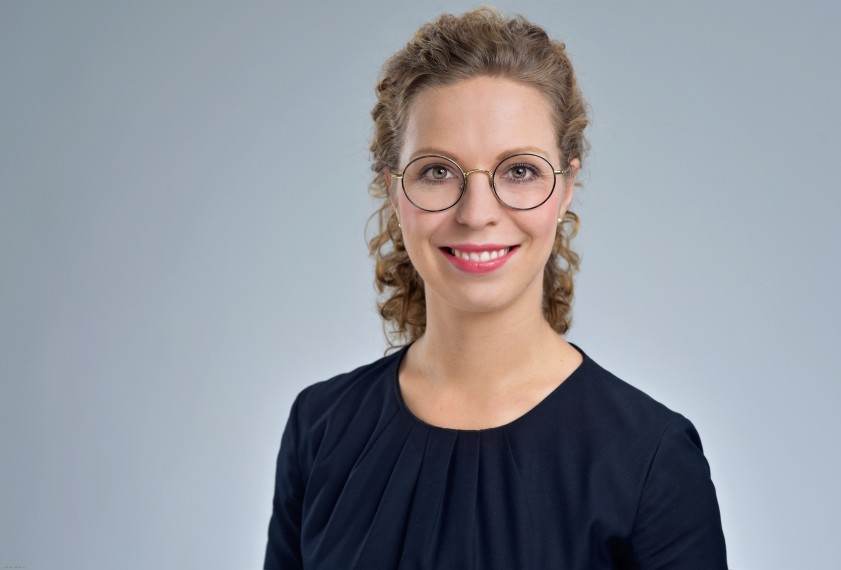How New Work works at the HDI Group
At the moment, there are not many jobs that carry as much responsibility as Annika Illmer’s remit. As Head of the Group Crisis Staff, she is steering HDI through the pandemic and at the same time organising tomorrow’s world of work with “NewWork@HDI”.

Annika Illmer realised for the first time on the streets of Tel Aviv that she was about to encounter something really big. She had recently given up her old job and she was doing what she likes doing most when she has some spare time: travelling the world with a backpack. Annika Illmer still had a few weeks to go before she was due to start at the HDI Group. Her new position was Head of Business Organisation and Manager of the Group Crisis Staff. This team generally only came together when yet another exercise was being carried out. But here in Israel, the coronavirus had arrived some time ago in the towns and cities, and in the countryside. And it was quite clear to her that she wouldn’t be able to escape from this virus. Just one day before Israel shut down its borders, she took a flight out of the country.
Making the HDI Group more attractive
At the moment, there are not many jobs in the Group that carry as much responsibility as Annika Illmer’s remit. In her early thirties, she is currently working together with the other members of the Crisis Staff to steer the HDI Group in Germany through the pandemic. Ultimately, the health of all the employees and the stability of the business operations depend on the decisions made by this team. And at the same time, as Head of Business Organisation, she is also making arrangements for what is coming: The new world of work in Germany after the crisis. She needs to find answers to the questions about how, where and when employees will be working in the near future with “NewWork@HDI”. This is a gargantuan task. “I’m looking at the people, the technology and the spatial setting. We are currently cooperating with the divisions to build a framework. The aim is to make the HDI Group more attractive for all employees, including new members of the workforce in future. And also to be well prepared for the phenomenon that has been massively accelerated by the coronavirus: digitalisation, agility and fast solutions for the needs of our customers.”
Structuring changes
Anybody wanting to make an appointment with Annika Illmer needs a slice of luck if they are in a hurry. Her days are very busy, but she’s used to that. She started out in the chemicals industry with a twin-track training. Alongside her work, she took a degree in business administration, studying in the evenings and at weekends. Then she crowned her education with an MBA in Shanghai. Later on, she moved to AXA, where she earned her spurs as an executive assistant to the board before being appointed to a management position. But then she fancied a new challenge – and applied for a job at HDI. “Great opportunities opened up for me,” is how she describes this step. “I really enjoy shaping changes. And my new position is ideal for that.”
Most importantly, because virtually every employee in Germany comes into contact with business administration. Anybody provided with all the programs they need to do their work at their workstation has Annika Illmer’s team to thank. Her colleagues make arrangements for authorisation management with all the specialist departments. They are the custodians of smooth-running processes in the company, support far-reaching changes through new projects like “NewWork@HDI” in Germany, investigate new potential for improvements and work on leveraging them. Her colleagues thought up the following slogan: “We create [new] solutions”.
Suddenly in the firing line
When Annika Illmer signed her employment contract, the coronavirus was only a concept for very few people in Europe. On her first day at work, Germany was in the middle of its first lockdown. The water at the deep end she was thrown into could hardly have been colder. Without knowing the people and processes in the company, she was suddenly right at the centre of the action. “I knew that I could rely on my colleagues on the Crisis Staff, so that together we could steer the company through the crisis.” The team is made up of around 20 people who all contribute their own expertise, ranging from IT security, through human resources and Internal Services, to communication and legal affairs. “This team work is enormously important to me,” commented Annika Illmer. “It’s not possible for a single individual to get a grip on the pandemic. We work together to develop the best solution and then make a decision together as a team.” The management of the Group Crisis Team remained in the hands of her predecessor until she had become familiar with many parts of the organisation and had found her feet. In January, she took full responsibility for her role.
Sometime when it’s possible to travel again, Annika Illmer wants to return to Israel. Hiking in the Golan Heights, travelling across country by train. She would like to spend time doing this. After the coronavirus.